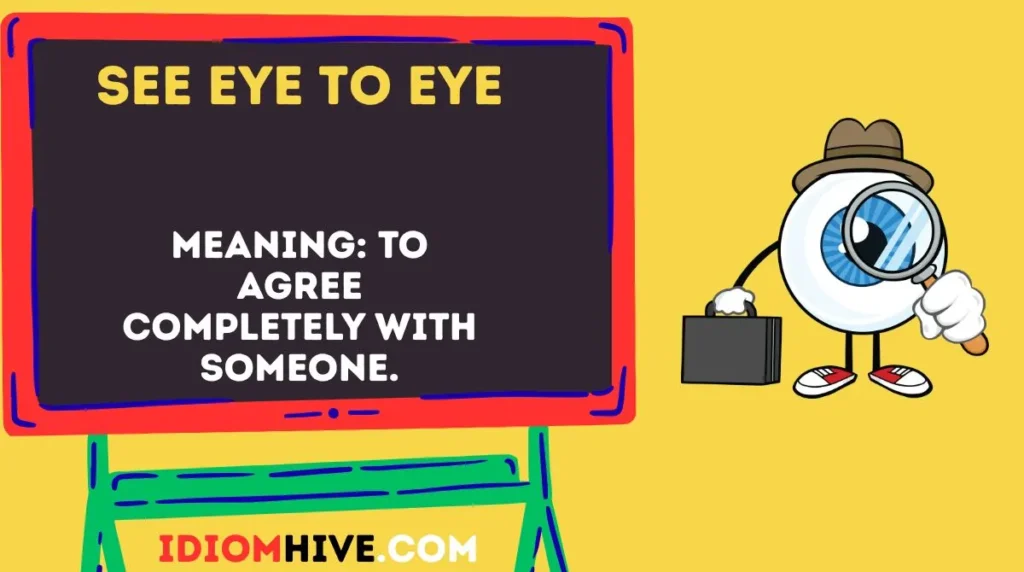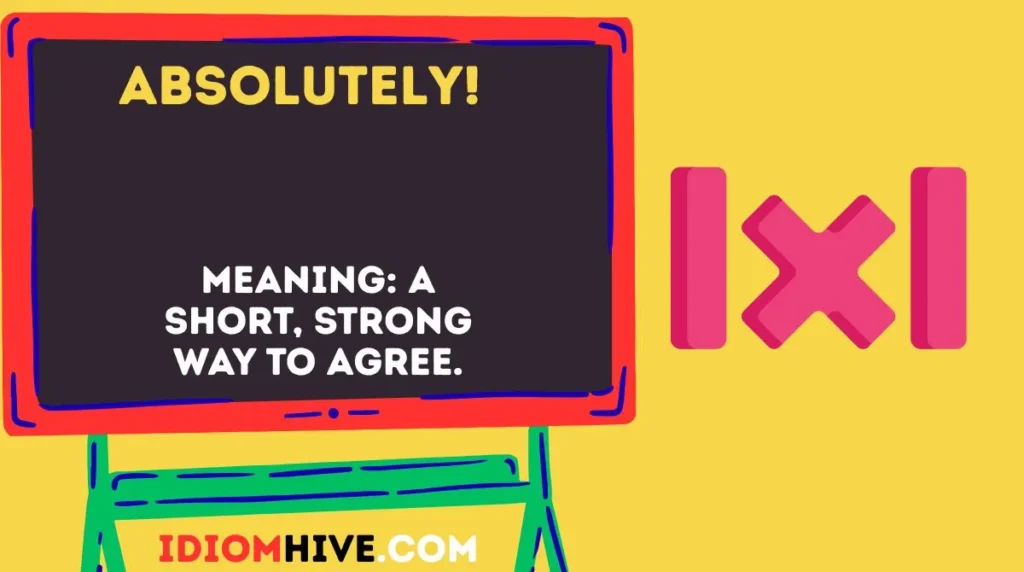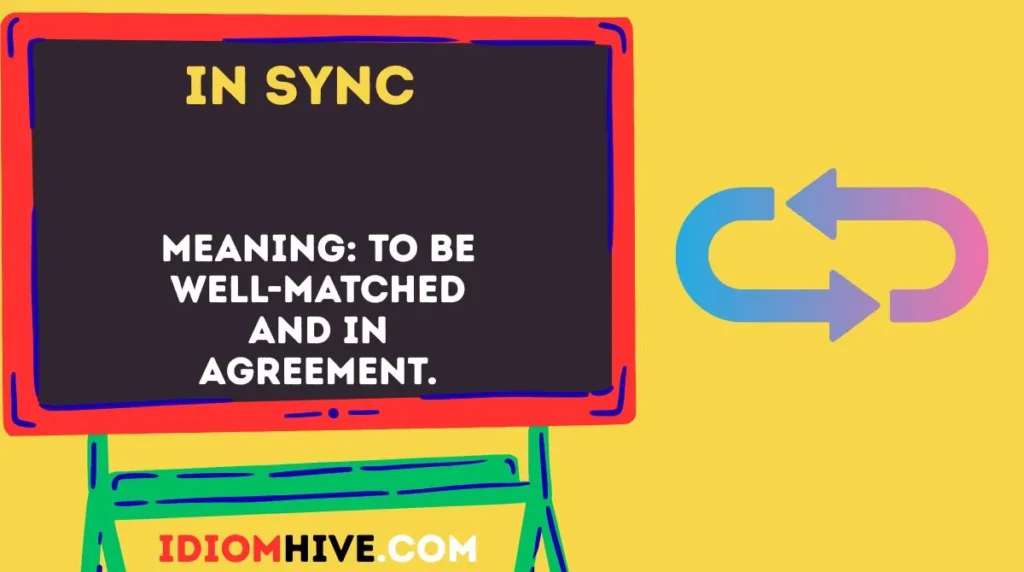When learning English, it’s not enough to know just the basic “yes” or “I agree.” To sound natural and fluent, you need idioms—those colorful expressions that native speakers use every day.
Idioms are short phrases with meanings different from the literal words. They add life, style, and personality to conversations.
When it comes to agreeing with someone, idioms play a big role. They help you express agreement in creative, polite, or even humorous ways.
Instead of repeating the same “me too” or “that’s right,” idioms allow you to fit smoothly into discussions, whether in casual chats with friends, classroom discussions, or professional meetings.
In this article, we’ll explore 40+ idioms for agreeing with someone, organized into useful groups. Each idiom comes with its meaning, example, similar expressions, and a note on where it’s often used. By the end, you’ll have plenty of natural phrases to use in daily conversations.
Did You Know?
The word “idiom” comes from the Greek word idiōma, meaning “a special feature” or “peculiarity.” That’s why idioms are unique ways of expressing ideas. Interestingly, many idioms for agreeing are rooted in history, music, and even old legal traditions—like “singing from the same hymn sheet,” which comes from church choirs needing to follow the same page to stay in harmony!
Idioms That Show Strong Agreement
On the Same Page
Meaning: To share the same understanding or opinion.
Example: “Before we start the project, let’s make sure we’re all on the same page.”
Similar Idiom: Singing from the same hymn sheet.
Note: Common in professional and teamwork situations.
Singing from the Same Hymn Sheet
Meaning: To agree and speak in the same way as others.
Example: “The whole team was singing from the same hymn sheet during the presentation.”
Similar Idiom: On the same wavelength.
Note: Slightly formal, often used in business or group contexts.
On the Same Wavelength
Meaning: To think in a similar way as someone else.
Example: “I love working with you—we’re always on the same wavelength.”
Similar Idiom: See eye to eye.
Note: Used in both friendly and professional conversations.
See Eye to Eye

Meaning: To agree completely with someone.
Example: “They don’t always see eye to eye, but on this issue, they both agreed.”
Similar Idiom: Be of one mind.
Note: Neutral tone, common in everyday English.
Be of One Mind
Meaning: To share the same opinion with someone.
Example: “We are of one mind about the importance of education.”
Similar Idiom: Speak the same language.
Note: More formal, often used in writing or speeches.
Speak the Same Language
Meaning: To understand each other easily and agree naturally.
Example: “Even though we’re from different countries, we speak the same language about values.”
Similar Idiom: On the same page.
Note: Can be literal (communication) or figurative (agreement).
Great Minds Think Alike
Meaning: People with intelligence often come up with the same idea.
Example: “I was about to suggest that too—great minds think alike!”
Similar Idiom: Two heads are better than one.
Note: Friendly, often used humorously.
Idioms for Casual and Friendly Agreement
You Can Say That Again
Meaning: A strong way of saying “I completely agree.”
Example: “It’s so hot today!” — “You can say that again.”
Similar Idiom: No doubt about it.
Note: Very informal, used in everyday conversation.
Tell Me About It
Meaning: To show agreement, often with a sense of shared frustration.
Example: “This traffic is terrible.” — “Tell me about it!”
Similar Idiom: Don’t I know it.
Note: Common in casual chats.
Don’t I Know It
Meaning: I strongly agree because I’ve experienced it too.
Example: “Raising kids is hard work.” — “Don’t I know it!”
Similar Idiom: Tell me about it.
Note: Informal, adds humor or empathy.
Couldn’t Agree More
Meaning: To fully agree with someone.
Example: “That movie was amazing!” — “Couldn’t agree more.”
Similar Idiom: Absolutely!
Note: Used both casually and professionally.
No Doubt About It
Meaning: Expresses certainty and agreement.
Example: “She’s the best player on the team.” — “No doubt about it.”
Similar Idiom: Without question.
Note: Common in everyday English.
Absolutely!

Meaning: A short, strong way to agree.
Example: “Do you want to go to the beach?” — “Absolutely!”
Similar Idiom: Definitely!
Note: Very versatile, used everywhere.
Definitely!
Meaning: Another simple way to strongly agree.
Example: “This plan will work, right?” — “Definitely!”
Similar Idiom: For sure.
Note: Informal and natural.
For Sure
Meaning: Yes, I agree completely.
Example: “He’s the funniest person in class.” — “For sure.”
Similar Idiom: Totally.
Note: Very casual, often used among friends.
Totally
Meaning: A quick, emphatic way of saying yes.
Example: “That was such a great idea.” — “Totally!”
Similar Idiom: 100 percent.
Note: Youthful and modern slang.
100 Percent
Meaning: To agree fully with someone.
Example: “She deserves the award.” — “100 percent.”
Similar Idiom: Absolutely.
Note: Informal, social media-friendly.
Idioms That Add Humor or Emphasis
Preaching to the Choir
Meaning: To agree with someone about something obvious.
Example: “We need better healthcare.” — “You’re preaching to the choir.”
Similar Idiom: Telling me what I already know.
Note: Informal, often used humorously.
That’s for Sure
Meaning: Shows strong agreement or certainty.
Example: “He’ll be late again.” — “That’s for sure.”
Similar Idiom: No doubt about it.
Note: Everyday spoken English.
Without a Doubt
Meaning: Complete agreement.
Example: “This is the best pizza in town.” — “Without a doubt.”
Similar Idiom: For sure.
Note: Neutral tone, can be casual or formal.
You Took the Words Right Out of My Mouth
Meaning: To agree because someone said exactly what you were thinking.
Example: “This weather is perfect!” — “You took the words right out of my mouth.”
Similar Idiom: Exactly!
Note: Often used in friendly conversations.
I’ll Drink to That
Meaning: Expressing agreement, often during celebrations.
Example: “To success and friendship!” — “I’ll drink to that!”
Similar Idiom: Cheers to that.
Note: Informal, social settings.
We’re in Accord
Meaning: To be in full agreement.
Example: “The committee members were in accord about the new rules.”
Similar Idiom: Be of one mind.
Note: More formal, often used in business or politics.
As One Man
Meaning: To agree or act together as a group.
Example: “The crowd rose to their feet as one man.”
Similar Idiom: In unison.
Note: Literary or formal tone.
Idioms for Professional and Formal Agreement
In Full Agreement
Meaning: To completely agree in a serious or official context.
Example: “The board members are in full agreement about the policy.”
Similar Idiom: Unanimous decision.
Note: Common in professional and legal contexts.
In Step With
Meaning: To agree or act in harmony with someone.
Example: “The new plan is in step with modern technology.”
Similar Idiom: Aligned with.
Note: Often used in business and politics.
In Harmony With
Meaning: To agree and work smoothly together.
Example: “His ideas are in harmony with the company’s values.”
Similar Idiom: In sync.
Note: Used in formal and artistic contexts.
In Sync

Meaning: To be well-matched and in agreement.
Example: “Their strategies are perfectly in sync.”
Similar Idiom: On the same wavelength.
Note: Professional but also common in casual use.
In Unison
Meaning: Agreeing and acting together at the same time.
Example: “The students answered in unison.”
Similar Idiom: As one man.
Note: Formal, often used in group settings.
Strike a Chord
Meaning: To strongly agree or connect with an idea.
Example: “Her speech struck a chord with the audience.”
Similar Idiom: Resonate with.
Note: Common in public speaking.
Consensus of Opinion
Meaning: A general agreement among a group.
Example: “The team reached a consensus of opinion on the matter.”
Similar Idiom: Mutual understanding.
Note: Very formal, used in professional writing.
How to Use These Idioms in Daily Life
- Speaking: Use casual idioms like Totally, For sure, and You can say that again in friendly conversations. For work or formal situations, go for On the same page or In full agreement.
- Writing: When writing essays or reports, formal idioms such as Consensus of opinion or Be of one mind sound more polished.
- Professional settings: Use idioms carefully. In meetings, phrases like In sync or In step with make you sound confident and collaborative.
Common Mistakes Learners Make With Idioms
- Wrong context:
❌ “You can say that again” in a business report.
✅ Use it in friendly conversations instead. - Literal use:
❌ “We were literally singing from the same hymn sheet.”
✅ “The team was singing from the same hymn sheet about the plan.” - Mixing idioms incorrectly:
❌ “We see eye on the same page.”
✅ “We see eye to eye” OR “We are on the same page.”
FAQs
1. Can idioms for agreement be used in professional emails?
Yes, but choose formal ones like In full agreement, Consensus of opinion, or In harmony with. Avoid slang like Totally.
2. Are these idioms used worldwide?
Many are common in English-speaking countries, but some may sound more natural in American English (like Tell me about it) or British English (like Singing from the same hymn sheet).
3. Can idioms replace simple “yes”?
Not always. Idioms make your English richer, but sometimes a direct “yes” is clearer and safer.
4. Which idioms are best for friendly conversations?
Phrases like Totally, For sure, Absolutely, and You can say that again are perfect for casual chats.
5. Do native speakers use these idioms often?
Yes, especially the short ones like Absolutely, Definitely, and For sure. Longer idioms like Preaching to the choir are used less often but still understood.
Conclusion
Idioms for agreeing with someone are more than just fancy phrases—they’re keys to sounding natural, confident, and connected in English conversations.
From casual chats with friends to serious business meetings, the right idiom can make you blend in like a native speaker.
Whether you say We’re on the same page in a project or Totally! with a friend, these expressions will help you communicate agreement with style and fluency. Keep practicing, notice how native speakers use them, and soon they’ll become a natural part of your English.










